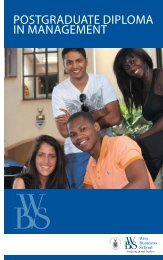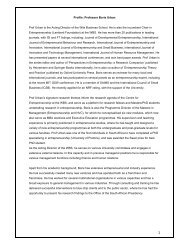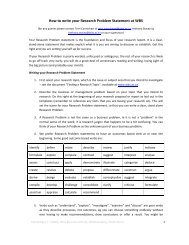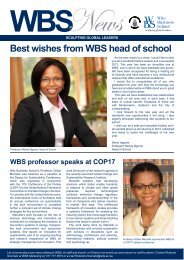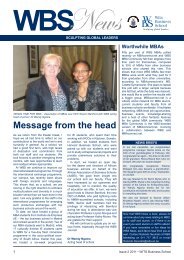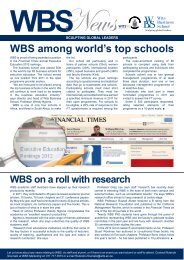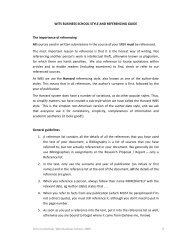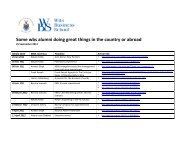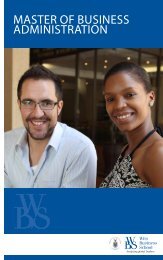map - Wits Business School
map - Wits Business School
map - Wits Business School
Create successful ePaper yourself
Turn your PDF publications into a flip-book with our unique Google optimized e-Paper software.
MANAGEMENT<br />
ADVANCEMENT<br />
PROGRAMME (MAP)
CONTENTS<br />
INTRODUCTION 3<br />
MAP TESTIMONIALS 4-5<br />
PROGRAMME 6-10<br />
JHB TIMETABLE 2012 11<br />
MAP TEAM 12<br />
LECTURERS 13-14<br />
2
iNTRODuCTiON<br />
MAP has grown significantly over the past few years in terms of student numbers, revenue<br />
and popularity. it has established itself as one of the most sought-after programmes on the<br />
WBS campus. For this, we thank the staff who work on it, as well as those members of the community,<br />
corporate world and public service who find value in it.<br />
in 2011, MAP marked its 100th intake since the inaugural MAP 1 started in 1979, thus setting<br />
a solid reputation for itself over the years. There is no corner of the world where you will not<br />
bump into one of our alumni. in addition, there are countless other corporate MAPs run offcampus<br />
either as corporate/in-house or public programmes in the provinces.<br />
The Management Advancement Programme (MAP) is designed to assist managers in developing<br />
a well-rounded approach to managing a department or a business unit. The modules covered<br />
in the programme are human resources, economics, operations management, finance<br />
and accounting, strategy and marketing. The MAP programme has been run by the business<br />
school for over 25 years and has a good reputation among employers. The programme is<br />
aimed at middle managers who want to fast-track their careers. Participants who successfully<br />
complete the programme will receive a certificate of competence.<br />
3
MAP TESTiMONiALS<br />
The MAP programme gave me a massive amount of personal growth. The programme’s<br />
subjects were very relevant and the lecturers did very well in getting the message across with<br />
practical day-to-day business examples. When applying for the programme, i never imagined<br />
how valuable a life experience it would be. i will never underestimate the value of time again.<br />
Managing family life, work commitments and the MAP tasks was certainly a huge challenge.<br />
The friendships i gained are set in stone and i look forward to bumping into other fellow MAP<br />
100 students in the business environment. i would recommend the MAP programme to any<br />
individual looking to further their knowledge or just for personal growth.<br />
Many thanks to the MAP office for their help and support throughout my time at WBS.<br />
Jamie Wilson<br />
i commenced MAP in March 2010 and my primary objective was to gain a better, broader and<br />
more insightful knowledge and perspective of general business. My decision to choose WBS<br />
was easy: reputation and recognition as a great <strong>Business</strong> <strong>School</strong>.<br />
My learnings from the content of the programme were of incredible value. Equal to the<br />
curriculum was the value i gained from class participation. The questions and resultant<br />
answers as well as healthy debate from both student and lecturer were of immense value.<br />
i also thought i’d never admit that the Syndicate method of learning mimics so much of<br />
the real world business setting. There will always be diversity, even an idleness and lack of<br />
participation in teams. it’s our ability to manage those individuals that determines success.<br />
i’m living my dream, thanks very largely to my MAP qualification.<br />
Tim Borland<br />
What MAP has done for me is to reignite my passion for learning. All those Saturday mornings<br />
have proven to be a catalyst for further learning.<br />
MAP has turbo-boosted my career. Although i have been in HR management for a while, i had<br />
come to a point of touching the ceiling and wondering if there was anything more exciting to<br />
be done. MAP has helped me to approach my role from a strategic angle and that has added<br />
tremendous value to the way i approach problems and challenges. Although i am not a CEO<br />
or a director yet, i am confident that is attainable in the not too distant future. in fact, since<br />
i have been doing MAP many doors have opened for me. i have been invited to executive<br />
briefings and meetings where my input has been sought by decision makers. i am now able<br />
to hold my own when discussing economics, finance and general business matters. Without a<br />
doubt, MAP has made me look good.<br />
You guys are doing a great job. The quality of teaching, administration and prestige associated<br />
with WBS is world class and i am proud to be associated with you.<br />
Muziwethu Zwane<br />
4
MAP TESTiMONiALS<br />
CONTiNuED<br />
The benefits i received from studying MAP is the discipline and to work under pressure. The<br />
ability to work with a group and to be able to sacrifice time to meet deadlines in terms of assignments.<br />
At work i am more aware of what is happening around me and i can now relate<br />
business problems in the South African context. i recently attended the Change Management<br />
course and was able to apply the knowledge i learned from Human Resources Principles. With<br />
the knowledge i gained i can change my work environment and motivate other employees<br />
and apply it throughout my career and day to day life.<br />
Ntaoleng Mahlasela<br />
The best element for me has been the added confidence i now feel i’ve gained from completing<br />
the course. The most valuable for me has been the new friendships/networking group<br />
links i have made since completing the course.<br />
Shane Pirie<br />
The greatest benefit i have had is out-of-the-box learning. i now sit in my meetings and approach<br />
them in a different manner. i have learnt valuable managerial, and, to an extent, life skills.<br />
i have also learnt the art of having to work with a group of dynamic people and be able to<br />
get along. MAP has put me on a great path and i have received great acknowledgment of my<br />
studies and performances from my management team.<br />
Hamilton Ndlovu<br />
MAP has been an eye-opener on a multiple front in addition to my academic achievement. it<br />
has changed how i interact with people – at work and outside the workplace. i listen and am<br />
able to read between the lines and apply my mind to not only the words spoken but to the<br />
undertone message and how it is being conveyed. it has given me a different outlook on how<br />
to succeed in business. it has certainly added value in how i conduct myself and execute my<br />
responsibilities as a leader in the work place. i was lucky enough to change jobs during my<br />
MAP programme and even at that early stage, i could already apply what i was learning in the<br />
MAP class. i would recommend MAP to every leader or aspiring leader out there, it is a great<br />
investment and you can only change for the better.<br />
Junia Morare<br />
5
COURSE OBJECTIVE<br />
The Management Advancement Programme (MAP) is a part-time course designed to assist<br />
managers whose experience and primary activities have been in a specialised functional area.<br />
The objective is to give managers broad exposure to the fundamental nature of the management<br />
process and human behaviour within organisations.<br />
SPECIFIC OBJECTIVES<br />
• To broaden the perspective of participants whose previous experience has mainly been in<br />
a specialist area.<br />
• To provide directors, executives and managers with knowledge, skills and techniques that<br />
will lead to more professional management.<br />
• To develop the ability to make sound and informed decisions.<br />
• To increase effectiveness in working with people of different cultures and values.<br />
• To increase awareness of the economic, political and social factors which affect business<br />
management in South Africa and globally.<br />
WHO SHOULD ATTEND?<br />
Directors, executives and managers currently employed in managing a functional (specialised<br />
function) area, such as marketing, finance or human resources management, in commerce, industry<br />
or service organisations, working to prepare for transition to a more generalised managerial<br />
function where they are expected to look at business holistically.<br />
Typically, applicants will have at least five years’ work experience, preferably in a management<br />
-related function, or recently promoted to management, or tipped for promotion and be at<br />
least 25 years of age. Applicants should also have post-matric qualifications, in addition to<br />
the required managerial experience. Those selected should demonstrate commitment to selfdevelopment<br />
and a desire for improving their organisation’s performance.<br />
The profile of MAP students ranges from directors, executives to middle managers and CEOs.<br />
The programme is also open to those within industry, struggling to make a transition into the<br />
world of business from specialised areas or functions such as entrepreneurs, as well as those<br />
in the medical profession, including medical doctors.<br />
PROGRAMME STRUCTURE<br />
PROGRAMME<br />
The programme has a modular structure of six courses of study, two non-examinable, but<br />
compulsory modules, Group Dynamics and <strong>Business</strong> Simulation. The course commences with<br />
a compulsory two-day full-time Group Dynamics Programme. Thereafter, students begin the<br />
programme itself, completing two courses at a time – in sequence. Part-time students will<br />
attend lectures on Saturday mornings or twice a week after work. Students on the full-time<br />
option will attend the four study blocks.<br />
6
PROGRAMME<br />
CONTiNuED<br />
PROGRAMME CONTENT<br />
GROUP DYNAMICS [BUSA 5062]<br />
This course develops skills with regard to team building, group and team interaction; with<br />
issues of diversity and diversity management being emphasised. Group dynamic theory is<br />
interspersed with interactive learning. This course also serves as an introduction to adult education<br />
and the philosophy of life-long learning as well as the principles of interactive and<br />
participatory learning processes.<br />
PRINCIPLES OF HUMAN RESOURCES MANAGEMENT [BUSA 5059]<br />
INDUSTRIAL RELATIONS [BUSA 5050]<br />
This course develops an understanding of the human aspects of business management and<br />
work organisation. it also provides insight into the factors influencing attitudes in the workplace<br />
as well as individual and group behaviour in organisations. Strategies for handling, designing<br />
and supervising work, communication in the organisation, managing change, work<br />
performance levels, organisation design and managing diversity in organisations are also<br />
covered. The Human Resources Management (HRM) module is divided into HRM, industrial<br />
Relations (iR) and Diversity Management.<br />
PRINCIPLES OF ECONOMICS [BUSA 5058]<br />
This course will give an overview of business and the economy as well as an analysis of consumer<br />
demand and production costs in competitive environments. it will also develop an<br />
understanding of pricing strategies in the micro-economic environment, introduction to the<br />
political economy of South Africa and internationally, concepts in micro- and macro-economics,<br />
alternative economic policy frameworks, future scenarios and challenges for the South<br />
African political economy. The domestic macro-economic environment will be assessed in<br />
terms of the economy and fiscal and monetary policy. international trade and exchange rate<br />
policy and economic growth and development within an international macro-economic environment<br />
will be discussed. This includes an integrated, social-scientific analysis of the global,<br />
African and South African business environments.<br />
PRINCIPLES OF ACCOUNTING AND FINANCE [BUSA 5057]<br />
The purpose of this course is to develop candidates’ skills with regard to fundamental principles<br />
in the broad area of financial management. At the end of this course, candidates are<br />
empowered with managerial accounting and financial management skills. Topics covered include<br />
financial statements, break-even analysis, financial statement analysis, cost allocation<br />
methods, the concept of ‘the time value of money’, share valuation, investment criteria, project<br />
analysis, and short-term finance and planning. The knowledge underpinning the abovementioned<br />
outcome is: the sequence of events in preparing financial statements, the use of<br />
financial statements’ frameworks in conducting break-even analysis and setting business performance<br />
targets, the role ‘time value of money’ plays in promoting the efficient allocation of<br />
scarce resources (mostly money) within an organisation, how strategic planning for an entity<br />
integrates with financial management and the link between financial management and performance<br />
management.<br />
7
PRINCIPLES OF MARKETING [BUSA 5060]<br />
This course introduces candidates to the marketing concept, development and techniques<br />
with regard to market research, market segmentation, product strategy, distribution strategy,<br />
promotion and price strategy, development and implementation of marketing plans.<br />
PRINCIPLES OF OPERATIONS MANAGEMENT [BUSA 5061]<br />
The ability to use good judgement in any type of operating environment is important for<br />
service or manufacturing, through to continuous type operations. A system view of operations,<br />
the concept of productivity, total quality control (TQC), operations planning and control,<br />
time-based competition, inventory control and operations strategy will be included.<br />
PRINCIPLES OF STRATEGIC MANAGEMENT [BUSA 5056]<br />
The purpose is to give candidates a basic understanding of the role of strategy in an organisation,<br />
as well as issues that affect competition locally and globally. Basic tools for the strategic<br />
analysis of the external and internal environment of the organisation will be presented.<br />
ADDITIONAL MODULES<br />
The MAP is the only course in Executive Education that offers supplementary (additional,<br />
non-examinable modules) modules for the holistic personal and professional development<br />
of students. These modules complement and round off the knowledge gained in the six, core<br />
assessment modules and zoom in on the latent leadership qualities/ potential residing in each<br />
individual.<br />
The university will determine on a case-for-case basis as to which three modules to offer at<br />
the appropriate time, for a particular class. The programme runs over three days after the final<br />
MAP examinations and attendance is compulsory and non-negotiable.<br />
Programme runs over 3 days.<br />
PROGRAMME TIMING<br />
The programme is offered frequently in the following two formats: part-time students are<br />
required to attend lectures on Saturday mornings or two evenings per week. Full-time (block<br />
release) students are required to attend the four study blocks.<br />
Each student will be assigned to a syndicate group and syndicate meetings will normally be<br />
organised by its members at a time and place which suits them or, in some cases, as directed<br />
by the Programme Director. Depending on demand, the programme is offered in Cape Town,<br />
Durban and Polokwane.<br />
8
PROGRAMME<br />
CONTiNuED<br />
WORK LOAD<br />
in addition to classroom work and syndicate meetings, full-time students will be expected<br />
to complete assignments and prepare for classroom sessions during the breaks. Part-time<br />
students will be expected to devote an additional eight hours per week for syndicate work,<br />
assignments and classroom preparation.<br />
Students will be required to submit an individual assignment, a syndicate assignment or presentation,<br />
and a final written examination which may be an open or closed book examination.<br />
Attendance at all classes and syndicate sessions is compulsory to ensure full participation<br />
and contribution to the group learning process.<br />
APPLICATION AND CLOSING DATES<br />
Application forms are available from the WBS webpage (www.wbs.ac.za) or can be requested<br />
from the MAP Office (+27 11 717-3132/3628/3113) or email: khosi.nkosi@wits.ac.za,<br />
lehlohonolo.mphuthi@wits.ac.za. They may be emailed or faxed back to the office.<br />
Please complete all three parts of the application, submit copies of certificates obtained and<br />
a copy of iD, ensure that all the relevant parties i.e. Supervisor/ Manager/ Mentor or HR department<br />
have all signed their respective sections. incomplete application forms will not be<br />
considered. Places will be offered to suitable candidates on a first-come, first-served basis.<br />
Those applicants who are accepted will be notified, at which time the full course fee must be<br />
paid. Registration will only be completed on receipt of the full fee.<br />
Cancellations will be accepted up to one month before commencement of the course without<br />
charge. Cancellations within 30 days of the commencement date will incur a cancellation<br />
fee of R3 000. However, students wishing to cancel within one week of the commencement<br />
date will be liable for the full fee. No refunds will be awarded after the first attendance of the<br />
programme.<br />
COURSE FEE<br />
Fees must be paid upfront on registration. Otherwise, funder’s/ employer’s letter must be<br />
provided on registration, in which case fees must be paid within 30 days of registration. The<br />
all-inclusive course fee that covers tuition, textbooks, course packs, examinations, refreshments<br />
and appropriate lunches is R43 365. Fees are to be paid within 30 days upon receiving<br />
the invoice.<br />
SELECTION<br />
Applicant must have obtained a minimum of Matric accompanied by some post-Matric level<br />
studies i.e. certificate, diploma or degree or postgraduate qualification. The Management<br />
Advancement Programme is a post-graduate certificate of competence. Participants will be<br />
selected on the basis of their management track record and their commitment to career development.<br />
9
LIBRARY AND COMPUTER FACILITIES<br />
The Faculty of Management Library, known as the John S Schlesinger Library, contains more<br />
than 10 000 volumes and subscribes to over a hundred journals.<br />
THE LIBRARY IS OPEN FROM:<br />
09:30-22:00 Monday to Thursday<br />
09:30-17:00 Friday<br />
09:00-13:30 on Saturday<br />
During the period of the course the library and computer lab facilities are available to all<br />
participants.<br />
ALUMNI AFFAIRS & COMMUNICATIONS<br />
Completing the Management Advancement Programme (MAP) entitles you to become a<br />
member of the <strong>Wits</strong> <strong>Business</strong> <strong>School</strong> Alumni. The aim of the Alumni is to provide continuing<br />
opportunities for the exchange of knowledge between business leaders, faculty and former<br />
students, as well as to promote an ongoing relationship between its members. By joining,<br />
students are kept informed of regular meetings, talks and discussions, as well as information<br />
on activities at the <strong>School</strong>.<br />
ENQUIRIES<br />
Should you wish to obtain an application form, you can download copies off our website. Alternatively,<br />
please contact one of our programme managers below. For any further enquiries,<br />
please contact the relevant programme managers.<br />
PROGRAMME MANAGERS<br />
KHOSI NKOSI<br />
Telephone: (011) 717 3628<br />
Fax2email: 086 765 4267<br />
Email: khosi.nkosi@wits.ac.za<br />
NATANYA ALEXANDER<br />
Telephone: (011) 717 3912<br />
Fax2email: 086 765 5013<br />
Email: natanya.alexander@wits.ac.za<br />
ROSHANA FROON<br />
Telephone: (011) 717 3574<br />
Email: roshana.froon@wits.ac.za<br />
LEHLOHONOLO (HLONNY) MPHUTI<br />
Telephone: (011) 717 3113<br />
Fax2mail: 086 765 4359<br />
Email: lehlohonolo.mphuti@wits.ac.za<br />
WBS Address: 2 St David’s Place, Parktown, 2193 PO Box 98, <strong>Wits</strong> 2050, South Africa<br />
Web: www.wbs.ac.za<br />
10
MAP<br />
MAP 103 PART TIME<br />
Tuesdays & Thursdays<br />
Times: 17:45 - 20:30<br />
MAP 103 PART TIME<br />
JHB TiMETABLE 2012<br />
or<br />
Saturdays<br />
Times: 08:00 – 13:30<br />
MAP<br />
MAP 104 103 BLOCK PART TIME RELEASE<br />
Monday Tuesdays<br />
to &<br />
Saturday Thursdays<br />
Classes<br />
Times:<br />
08:00 17:45<br />
– - 20:30<br />
17:00<br />
or<br />
Saturdays<br />
Times: 08:00 – 13:30<br />
MAP 105 104 PART BLOCK TIME RELEASE<br />
Mondays Monday to<br />
& Saturday<br />
Wednesdays Classes<br />
Times:<br />
17:45 08:00<br />
- –<br />
20:30 17:00<br />
or<br />
Saturdays<br />
Times: 08:00 – 13:30<br />
MAP 106 105 WEEKEND<br />
PART TIME<br />
BLOCK RELEASE<br />
Mondays BLOCK RELEASE & Wednesdays<br />
Thursdays, Times: 17:45<br />
Fridays - 20:30<br />
& Saturdays<br />
Times: 08:00 – 17:00<br />
or<br />
Saturdays<br />
Times: 08:00 – 13:30<br />
MAP 106 WEEKEND<br />
BLOCK RELEASE<br />
Thursdays, Fridays & Saturdays<br />
Times: 08:00 – 17:00<br />
MAP 107 PART TIME<br />
Tuesdays Mondays & Thursdays Wednesdays<br />
Times: 17:45 - 20:30<br />
or<br />
Saturdays<br />
Times: 08:00 – 13:30<br />
MAP 107 PART TIME<br />
Mondays & Wednesdays<br />
Times: 17:45 - 20:30<br />
or<br />
DURATION<br />
CLASS<br />
26 JANUARY – 07 SEPTEMBER 2012<br />
26 & 27 January 2012<br />
Group Dynamics<br />
31 January - 31 March 2012 HRM & ECO<br />
Monday, 2 April 2012<br />
Examination: HRM & ECO<br />
10 April - 9 June 2012<br />
MKT & FiN<br />
Monday, 18 June 2012<br />
Examination: MKT & FiN<br />
19 Jun June - - 18 18 Aug August 2012 2012 STR & OPS<br />
Monday, 27 August 2012 Examination: STR & OPS<br />
3-5, DURATION 6-8 September 2012 Additional CLASS Professional Development Modules<br />
26 JANUARY 12 APRIL – - 14 07 AUGUST SEPTEMBER 2012 2012<br />
12 26<br />
&<br />
13 27<br />
April January<br />
2012 2012<br />
Group<br />
Dynamics<br />
16 31<br />
April January<br />
to 21 - 31<br />
April March<br />
2012 2012<br />
Human HRM & ECO<br />
Resource Mgmt & Economics<br />
Friday, Monday,<br />
25 2<br />
May April<br />
2012<br />
Examination:<br />
HRM<br />
&<br />
ECO<br />
28 10<br />
May April<br />
to - 9<br />
02 June<br />
June 2012<br />
2012<br />
Marketing MKT & FiN<br />
& Finance<br />
Friday, Monday,<br />
6 July 18 June<br />
2012 2012<br />
Examination:<br />
MKT<br />
&<br />
FiN<br />
9 19<br />
July Jun<br />
to - 18<br />
14 Aug<br />
July 2012<br />
2012<br />
Strategy STR & OPS<br />
& Operations<br />
Tuesday, Monday,<br />
14 27<br />
August<br />
2012<br />
Examination:<br />
STR<br />
&<br />
OPS<br />
15 3-5,<br />
to 6-8<br />
17 September<br />
August 2012 2012<br />
Additional<br />
Professional<br />
Development<br />
Modules<br />
08 12 MARCH APRIL - - 03 14 NOVEMBER AUGUST 2012 2012<br />
8 12<br />
& &<br />
9 13<br />
March April<br />
2012<br />
Group<br />
Dynamics<br />
12 16<br />
March April to<br />
- 21<br />
19 April<br />
May 2012<br />
HRM Human<br />
& ECO Resource Mgmt & Economics<br />
Monday, Friday, 25<br />
28 May<br />
May 2012<br />
2012<br />
Examination:<br />
HRM<br />
&<br />
ECO<br />
29 28<br />
May<br />
- to<br />
4 02<br />
August June<br />
2012<br />
MKT Marketing<br />
& FiN & Finance<br />
Monday, Friday, 6 July<br />
13 August 2012<br />
2012 Examination:<br />
MKT<br />
&<br />
FiN<br />
14 9 July<br />
Aug August to<br />
-<br />
14<br />
13 - July<br />
October 13 October 2012<br />
2012 2012 STR Strategy<br />
& OPS & Operations<br />
Monday, Tuesday, 14<br />
22 August<br />
October 2012<br />
2012 Examination:<br />
STR<br />
&<br />
OPS<br />
29-31 15 to<br />
October 17 August<br />
& 1-3 2012<br />
November 2012 Additional<br />
Professional<br />
Development<br />
Modules<br />
8 & 9 March 2012<br />
08 21 MARCH JUNE – - 26 03 OCTOBER NOVEMBER 2012 2012<br />
21 JUNE – 26 OCTOBER 2012<br />
Group Dynamics<br />
21 12<br />
& March<br />
22 June - 19<br />
2012 May 2012<br />
Group HRM &<br />
Dynamics ECO<br />
28-30 Monday,<br />
June 28<br />
2012 May 2012<br />
Human Examination:<br />
Resource HRM<br />
Management<br />
& ECO<br />
5-7 29 May<br />
July -<br />
2012 4 August 2012<br />
Principles MKT & FiN<br />
of Economics in <strong>Business</strong><br />
Wednesday, Monday, 13 August<br />
1 August 2012<br />
2012 Examination:<br />
HRM MKT & & FiN<br />
ECO<br />
2-4 14 Aug<br />
August - 13<br />
2012 October 2012<br />
Principles STR & OPS<br />
of Marketing<br />
16-18 Monday,<br />
August 22 October<br />
2012 2012<br />
Principles Examination:<br />
of Finance STR & OPS<br />
Wednesday, 29-31 October<br />
19 & 1-3<br />
September November<br />
2012<br />
Examination: Additional Professional<br />
MKT & FiN FiNDevelopment<br />
Modules<br />
20-22 September 2012<br />
Principles of Strategy<br />
27-29 September 2012 21 JUNE –<br />
2012<br />
Principles 26 OCTOBER<br />
Principles of Operations 2012<br />
Operations & Supply Chain Mgmt<br />
Wednesday, 21 & 22 June<br />
24 2012<br />
October 2012 Examination: Group Dynamics<br />
STR & OPS<br />
25-27 28-30<br />
October June 2012<br />
2012<br />
Additional Human Resource<br />
Professional Management<br />
Development Modules<br />
5-7 July 2012 06 SEPTEMBER Principles 2012 – of 29 Economics JUNE 2013 in <strong>Business</strong><br />
6 06 Wednesday,<br />
& & 7 07 September September 1 August<br />
2012 2012 2012<br />
Group Examination:<br />
Dynamics HRM & ECO<br />
11 2-4<br />
September Sep August - 10 2012 November - 10 November 2012 2012 HRM Principles<br />
& ECO ECOof<br />
Marketing<br />
Monday, 16-18 August<br />
19 November 2012<br />
2012 Examination: Principles of Finance<br />
HRM & ECO<br />
15 Wednesday,<br />
January - 19<br />
16 September<br />
March 2013 20132012<br />
MKT Examination:<br />
& FiN MKT & FiN<br />
Monday, 20-22 September<br />
25 March 2012<br />
2013<br />
Examination: Principles of Strategy<br />
MKT & FiN<br />
2 27-29<br />
April September<br />
- 8 June 2013 2012<br />
STR Principles<br />
& OPS OPSof<br />
Operations & Supply Chain Mgmt<br />
Tuesday, Wednesday,<br />
18 June 24 October<br />
2013 2012<br />
Examination:<br />
STR<br />
&<br />
OPS<br />
24-26 24–26 25-27<br />
June<br />
October June & 27-29 2012<br />
June 2013 Additional<br />
Professional<br />
Development<br />
Modules<br />
06 SEPTEMBER 2012 – 29 JUNE 2013<br />
06 & 07 September 2012 Group Dynamics<br />
11 Sep - 10 November 2012 HRM & ECO<br />
Monday, 19 November 2012<br />
11<br />
15 January - 16 March 2013<br />
Examination: HRM & ECO<br />
MKT & FiN<br />
Monday, 25 March 2013<br />
Examination: MKT & FiN
HEAD OF MAP: PROFESSOR RASOAVA RIJAMAMPIANINA (RIJA)<br />
DSSC, DECSA (Madagascar), MBA (Otaru, Japan), DBA (Hokkaido university, Japan)<br />
Rija is the Head of the Management Advancement Programme (MAP) at <strong>Wits</strong> <strong>Business</strong> <strong>School</strong><br />
(WBS). Previously, he was the Academic Director at WBS and Director of the Senior Executive<br />
Programme for Southern Africa – a joint initiative of WBS and Harvard <strong>Business</strong> <strong>School</strong> (uSA).<br />
Before joining WBS, he was a Senior Research Associate in the Faculty of Economics and <strong>Business</strong><br />
Administration at Hokkaido university (Japan). He has also been an auditor-consultant<br />
at Delta Audit Deloitte & Touche (Madagascar) for many years and the overseas consultant for<br />
the indian Ocean Resources for Quality. Rija’s research and teaching interests include multicultural/diversity<br />
management; organisational learning; organisational change, and human<br />
capital management. His work has resulted in numerous publications in scholarly journals<br />
and international conference proceedings.<br />
Rija is a member of several international academic associations, such as Asian Academy of<br />
Management (AAM); the Association of Japanese <strong>Business</strong> Studies (AJBS); Euro-Asia Management<br />
Studies Association (EAMSA); Japan Academy of international <strong>Business</strong> Studies (JAiBS);<br />
the Academic Association for Organisational Science (AAOS); Japan Society for Study of Office<br />
Automation (OA); the Society for intercultural Education, Training, and Research (SiETAR);<br />
the Southern Africa institute for Management Scientists (SAiMS); indian Ocean Resources for<br />
Quality (iORQ); the Association to Advance Collegiate <strong>School</strong>s of <strong>Business</strong> (AACSB) and the<br />
World <strong>Business</strong> university Association (WBuA).<br />
PROGRAMME MANAGERS<br />
ROSHANA FROON: Senior Programme Manager<br />
Roshana holds MBA, PDTE (Post Graduate Dip in Tertiary Education), PDM (Postgraduate Diploma<br />
in Management), Assessor isett, Moderator isett, Assessor & Moderator SSeta, ETDP<br />
(Outcomes Based Assessor), CiW Site Designer, CiW Associate & Professional, MSP (Microsoft<br />
Certified Professional), DPCW (Diploma in Computing), iCDL (international Computer Driving<br />
License), Bachelor in Min (current)<br />
Roshana has been involved in the education sector for the past 18 years. She has been part<br />
of a leading private education organization and has been instrumental in various aspects of<br />
business. Her experiences span quality assurance, developing academic content, lecturing,<br />
starting up new campuses and overseeing 28 campuses nationally.<br />
She later embarked on her own business in private education and has started and run three<br />
successful businesses to date.<br />
in addition to her strong academic background, and her successes as an entrepreneur, she is<br />
committed to delivering quality education and in affording people a second chance. in her<br />
spare time she lectures at a Shelter for Abused Women and she offers academic support to<br />
adults who want to obtain their matric certificate.<br />
KHOSI NKOSI<br />
Khosi came to <strong>Wits</strong> <strong>Business</strong> <strong>School</strong> (WBS) in 2008 to work in the MAP office to assist with corporate<br />
and regional MAP Programmes, in KwaZulu-Natal and Limpopo. Prior to joining WBS,<br />
Khosi worked as a doctor’s receptionist and for the Department of Education (Gauteng) as an<br />
administrator. She has a background in iT and data capturing and is currently studying for a BA<br />
(psychology) degree at uNiSA.<br />
NATANYA ALEXANDER<br />
MAP TEAM<br />
Natanya joined WBS in August 2009 as an Administrator and later became the Secretary to<br />
the Director: Executive Education. in the Executive Education Department she worked very<br />
closely with the Director: Corporate Programmes and also did all the Administration for infochoice,<br />
our Cape Town office. She also at the same time assisted in the Operations Department<br />
and Marketing Department as Events/Functions Coordinator. Natanya also worked on<br />
the New Managers’ Programme and the BBBEE programme within the same department and<br />
therefore gained useful experience of the WBS and its operations within a short space of time.<br />
Prior to joining WBS Natanya worked in the Motor industry for several years. She has a Secretarial<br />
Diploma and is a very enthusiastic, energetic and professional person.<br />
12
LECTuRERS<br />
MARKETING LECTURERS<br />
PROFESSOR GEOFF BICK<br />
BSc (Elec Eng) (uCT), BCom (uNiSA), MBA (uC, Berkeley, united States of America), DPhil<br />
(university of Johannesburg), CM (SA)<br />
LAURENCE BEDER<br />
MCom (<strong>Wits</strong>), BCom Hons (uNiSA)<br />
HUMAN RESOURCES LECTURERS<br />
PROFESSOR RASOAVA RIJAMAMPIANINA (RIJA)<br />
For full CV see page 12.<br />
CONRAD VIEDGE<br />
BA (Hons), MA (Psychology) (Witwatersrand)<br />
INDUSTRIAL RELATIONS LECTURER<br />
MICHAEL NDI MCETHE<br />
BAdmin (uNiSA), BEd (Witwatersrand), HipEd (Witwatersrand), LLM (uPE), MA (HR&LR) (uPE)<br />
ACCOUNTING & FINANCE LECTURERS<br />
DAVID ZIDEL<br />
Bcom(Hons), MBA<br />
DR THABANG MOKOALELI-MOKOTELI<br />
PhD (Finance), MA (Accountancy), BComm (Accounting)<br />
13
STRATEGIC MANAGEMENT LECTURERS<br />
MIKE CLARE<br />
BCom (university of Natal), MBA (WBS)<br />
ASSOCIATE PROFESSOR GILLIAN MARCELLE<br />
DPhil (university of Sussex, united Kingdom), Postgraduate Certificate, international Economics,<br />
Kiel institute of World Economics, MBA (George Washington university), BSc (Economics)<br />
(Hons) (university of the West indies)<br />
CRAIG MANNING<br />
BSc (Geology) (uCT), MBA, Postgraduate Diploma in Management (Marketing) (uCT)<br />
DR THABO MOSALA<br />
PhD (Rushmore, united States of America), MPhil (Pretoria), MBL (uNiSA), MSc (Rhodes), BSc<br />
(Hons) (Rhodes), BSc (Lesotho)<br />
KHOMOTSO PHIHLELA<br />
BSc (Eng), MBA<br />
ECONOMICS LECTURES<br />
PROFESSOR FREDERICK AHWIRENG-OBENG<br />
BSc (Hons), PhD (Leeds, united Kingdom), Ag Econ (Ghana)<br />
PROFESSOR CHRISTOPHER MALIKANE<br />
PhD (New <strong>School</strong> for Social Research, New York), MA Economics (Fordham university, New York)<br />
14
E+I 16568<br />
WITS BUSINESS SCHOOL, UNIVERSITY OF THE WITWATERSRAND<br />
2 St. David’s Place, Parktown, 2193 PO Box 98, <strong>Wits</strong> 2050, Johannesburg, South Africa,<br />
Call Centre: 0861 000 (WBS) 927, Website: www.wbs.ac.za<br />
Follow us on



